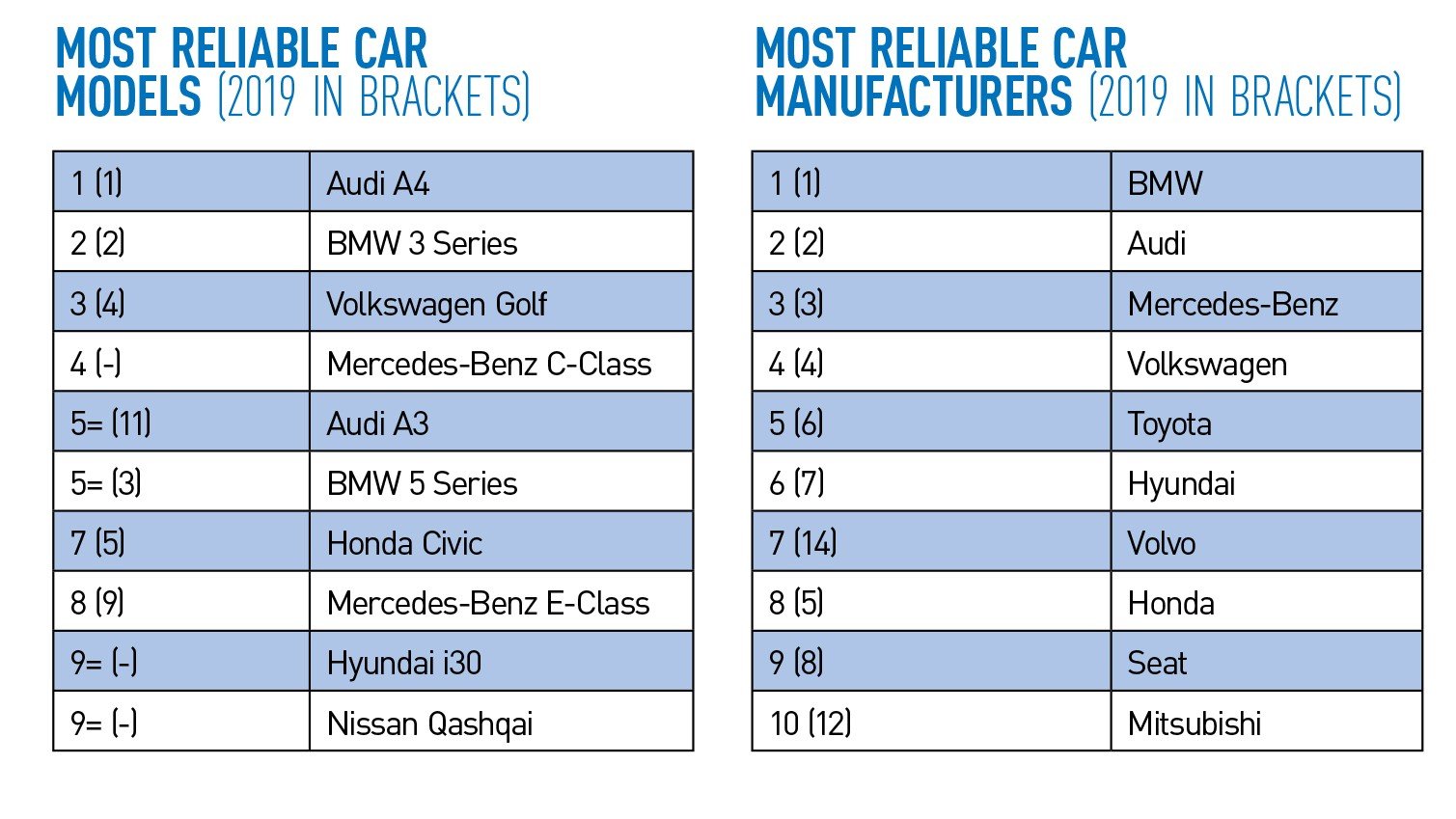Audi and BMW are two iconic car brands. Both are known for luxury and performance.
But how do they compare in reliability? This question interests car enthusiasts and prospective buyers alike. Understanding reliability helps in making informed decisions. It impacts maintenance costs, resale value, and overall satisfaction. Car reliability can be a deciding factor when choosing between these prestigious brands.
Audi and BMW have loyal fan bases who swear by their brands. Yet, each has its strengths and weaknesses in reliability. Comparing these brands helps highlight these areas. It offers insights into which may suit your needs better. This blog will guide you through the reliability aspects of both Audi and BMW. Get ready to dive into the details that matter most.
Brand Legacy And Reputation
When choosing between Audi and BMW, reliability is often a key concern. However, understanding their brand legacy and reputation can offer valuable insights. Both brands have cultivated a strong presence in the automotive world, each with its unique strengths and challenges. But what does this mean for reliability? Let’s dive into their histories and consumer perceptions to explore this further.
Historical Overview
Audi, founded in 1909, has always been synonymous with innovation. From their quattro all-wheel drive to cutting-edge designs, Audi has consistently pushed boundaries. This legacy of innovation translates into a commitment to quality, although it occasionally leads to complex engineering that can pose reliability challenges.
BMW, on the other hand, began its journey in 1916, initially focusing on aircraft engines. Known as the ‘Ultimate Driving Machine’, BMW prioritizes performance and driver experience. Their engineering prowess often results in durable vehicles, but some models have faced scrutiny over electronic issues.
Consumer Perception
Consumers often view Audi as a brand that offers luxury with a flair for technology. You might hear from Audi owners about the superior driving experience and sleek interiors. Yet, some raise concerns about maintenance costs and long-term reliability.
BMW owners frequently praise the brand’s performance and driving dynamics. You might have friends who swear by their BMW’s handling and speed. However, discussions often arise around the reliability of electrical systems, leaving some consumers cautious.
So, as a prospective buyer, what matters more to you? The thrill of performance or the assurance of reliability? Your answer might just guide you toward the brand that aligns with your values.
Ultimately, both Audi and BMW have their strengths and quirks. Understanding their legacy and reputation helps you make an informed decision that suits your needs.

Credit: www.youtube.com
Engineering And Design
Audi and BMW both offer impressive engineering and design. Yet, their reliability often sparks debate. Audi boasts cutting-edge technology, while BMW is known for its durability. Both brands have unique strengths, making the choice between them a matter of personal preference and priorities.
When considering the reliability of luxury vehicles, engineering and design play crucial roles in shaping your driving experience. Audi and BMW have long been rivals, each boasting impressive engineering feats and unique design philosophies. But when it comes to reliability, how do they stack up?Build Quality
Audi is renowned for its meticulous attention to build quality. You’ll notice the solid feel of the doors and the refined finishes inside the cabin. BMW, on the other hand, focuses on sporty precision. The materials used are robust, but they might not always feel as plush as Audi’s offerings. A friend once mentioned how their Audi seemed to age gracefully, maintaining its elegance over the years. In contrast, their BMW felt like a sports car that needed regular pampering. Does build quality affect long-term satisfaction for you?Innovative Features
Both brands are pioneers in automotive innovation. Audi integrates cutting-edge technology seamlessly, offering features like virtual cockpits and advanced driver assistance systems. These make driving feel futuristic and engaging. BMW prioritizes driving dynamics, with features like adaptive M suspension that enhance the driving thrill. You might find Audi’s tech appealing if you’re a gadget enthusiast. Alternatively, BMW’s innovations might excite you if you value the driving experience above all else. Have you ever felt overwhelmed by the tech in your car, or does it enhance your journey? Ultimately, the balance between engineering prowess and design aesthetics can sway your opinion on reliability. Which matters more to you: the feel of the car as you drive or the innovative features that simplify your journey?Performance Metrics
Performance metrics determine the reliability of Audi and BMW. Understanding engine performance and handling dynamics is crucial. This section explores these aspects.
Engine Performance
Audi engines offer impressive power and efficiency. Their turbocharged engines provide quick acceleration. Audi’s Quattro system enhances grip on the road. BMW engines, known for their smoothness, offer refined driving experiences. TwinPower Turbo technology boosts performance and fuel efficiency. Both brands excel in engine reliability and longevity.
Handling And Dynamics
Audi vehicles excel in precise handling. Their suspension systems ensure stability in corners. Steering is responsive, providing driver confidence. BMW cars offer exceptional driving dynamics. They are designed for sharp steering responses. The rear-wheel-drive layout enhances road feel. Both brands focus on balanced and enjoyable driving experiences.
Maintenance And Repair Costs
Audi and BMW offer luxury vehicles but differ in reliability. Audi often incurs higher maintenance and repair costs. BMW provides a slightly more cost-effective upkeep experience, appealing to budget-conscious drivers seeking reliability. These factors can influence decisions on long-term ownership.
When considering Audi and BMW, many potential buyers often weigh the maintenance and repair costs. Understanding these costs can be crucial for long-term satisfaction with your purchase. Both brands offer luxurious and thrilling driving experiences, but how do they stack up when it comes to keeping your car on the road without breaking the bank?Common Issues
Both Audi and BMW have their quirks. Audi owners frequently report electrical problems, such as malfunctioning infotainment systems and window regulators. These issues can be annoying, but they’re often relatively inexpensive to fix. BMW, on the other hand, is known for its engine issues, particularly the infamous oil leaks. While these can be more costly to repair, many BMW enthusiasts argue that the joy of driving outweighs these inconveniences. Have you ever spent more time in the shop than on the road with your car? It’s a question worth considering.Long-term Ownership Costs
Thinking about owning your car for several years? Maintenance and repair costs can add up over time. BMWs generally have higher long-term costs due to pricier parts and labor. Routine services like brake replacement and oil changes tend to be more costly compared to Audi. Audi might offer a slightly cheaper maintenance schedule, but frequent minor repairs can accumulate quickly. You might find yourself visiting the mechanic more often than you’d like. Would you prefer fewer visits to the shop or lower repair bills? Ultimately, your choice may depend on what you value more: lower long-term costs or fewer frequent repairs. As you weigh your options, consider what fits best with your lifestyle and budget. After all, it’s not just about the drive; it’s about the journey of ownership.Warranty And Support
Warranty and support play a crucial role in vehicle reliability. For Audi and BMW, understanding these aspects can influence purchase decisions. Buyers often seek assurance through comprehensive warranties and efficient support systems. Let’s explore the warranty coverage and customer service experience of both brands.
Coverage Details
Audi offers a four-year or 50,000-mile warranty. This warranty covers most vehicle components. Their warranty also includes a four-year roadside assistance. On the other hand, BMW provides a similar four-year or 50,000-mile warranty. Additionally, BMW offers a three-year or 36,000-mile maintenance plan. This plan covers regular services like oil changes.
Customer Service Experience
Audi owners report mixed experiences with customer service. Some praise the quick response and helpful support. Others find the service inconsistent. BMW generally receives positive feedback for customer service. Their representatives are known for being knowledgeable and professional. This consistency often leads to higher customer satisfaction.
User Experiences And Reviews
When choosing between Audi and BMW, reliability often tops the list of concerns. User experiences and reviews play a crucial role in making a decision. These insights offer real-world perspectives and help potential buyers gauge the longevity and dependability of these luxury brands.
Owner Testimonials
Audi owners frequently praise their vehicles for stylish design and smooth ride. Many mention minor mechanical issues after extended use. Some drivers report satisfaction with Audi’s customer service. BMW owners often highlight the brand’s sporty driving experience. Reliability varies, with some noting consistent performance over years. Others mention costly repairs.
Both brands have loyal followers. Audi enthusiasts often cite advanced technology features. BMW fans appreciate the dynamic handling. These testimonials provide valuable insights into daily ownership experiences.
Expert Reviews
Experts regularly evaluate Audi and BMW for reliability. Audi often receives high marks for design and innovation. Some experts note occasional electrical issues. BMW tends to impress with engine performance. Reliability ratings can fluctuate based on model and year. Automotive experts consider both brands leaders in luxury.
Professional reviews offer a detailed analysis. Experts test various aspects, including durability and maintenance. Audi and BMW both show strengths and weaknesses. Reviews help clarify reliability expectations for potential buyers.
Market Position And Competitiveness
Audi and BMW are known for luxury and performance, yet their reliability varies. Audi often faces electronic issues, while BMW’s maintenance costs can be high. Both brands have loyal fans, but reliability can sway opinions. Choosing between them depends on priorities.
Audi and BMW have long been fierce competitors in the luxury car market. Both brands are renowned for their craftsmanship, performance, and innovation. Yet, when it comes to reliability, the stakes get even higher. Understanding their market position and competitiveness is crucial for potential buyers who value a vehicle’s dependability. Let’s dive into how Audi and BMW stack up against each other in terms of global sales data and competitive comparisons.Global Sales Data
When you look at global sales data, you’ll notice that both Audi and BMW have a strong presence in many countries. BMW often leads in terms of overall sales figures, partly due to its diverse range of models. This includes everything from sleek sedans to robust SUVs. Audi, though slightly behind BMW in sales, is catching up fast with its innovative technologies and stylish designs. You might wonder, does higher sales imply better reliability? Not necessarily, but it can suggest strong consumer trust and brand loyalty.Competitive Comparisons
In competitive comparisons, BMW tends to focus on performance and driving experience. BMW’s reputation for sportiness and dynamic handling is hard to beat. This can be a crucial factor if you’re someone who loves the thrill of driving. Audi, on the other hand, emphasizes cutting-edge technology and comfort. Its Quattro all-wheel-drive system is legendary for ensuring stability and reliability in various conditions. While both brands offer distinct advantages, your choice might hinge on what you value most: the adrenaline of a sporty ride or the assurance of high-tech reliability. Ultimately, the real question is: how do you define reliability? Is it the ability to go the extra mile without issues, or the confidence that your car won’t let you down on a snowy day?
Credit: www.fleetnews.co.uk
Future Outlook
Choosing between Audi and BMW for reliability can be tricky. Both brands have loyal fans but present different challenges. Audi often impresses with technology, while BMW is praised for engineering quality.
When comparing Audi and BMW, the future outlook on reliability is a topic that sparks interest among car enthusiasts and prospective buyers alike. As both brands continue to evolve, understanding their direction is crucial. The future promises exciting developments in technology and strategies, which could redefine what reliability means for these automakers.Technological Advancements
Audi and BMW are both at the forefront of automotive technology. Audi is investing heavily in electric vehicles (EVs) and autonomous driving systems. Their focus on developing the Audi e-tron series highlights their commitment to sustainable and reliable transportation. On the other hand, BMW is pioneering innovations in hybrid technology and digitalization. Their i-series and the latest digital cockpit interfaces are examples of how they aim to enhance user experience and vehicle reliability. These advancements not only promise a greener future but also pose questions about the long-term reliability of complex tech. Will these innovations lead to more dependable vehicles, or will they introduce new challenges?Brand Strategies
Audi’s strategy is centered on pushing boundaries in design and engineering. They aim to blend luxury with cutting-edge tech, striving to maintain high standards of reliability. Their approach involves continuous improvement and rigorous testing of new models before they hit the market. BMW, meanwhile, focuses on creating a premium driving experience. Their strategy includes integrating customer feedback to refine their models continually. By prioritizing driver satisfaction and vehicle performance, they aim to uphold a strong reliability reputation. Both brands are also expanding their service networks and investing in customer relations. This ensures that, as a buyer, you not only get a reliable car but also a reliable service experience. What do you value more in a brand’s strategy: technological prowess or customer-centric approaches? As you weigh these insights, consider how these strategies and technologies align with your vision of reliability. The future of Audi and BMW lies in balancing innovation with dependability, and your perspective as a consumer will shape their journeys.
Credit: www.bmwofturnersville.com
Frequently Asked Questions
Are Audis Or Bmw More Reliable?
Audi and BMW both offer reliable vehicles, but individual models vary in dependability. BMW often scores higher in reliability surveys. Audi has improved its reliability in recent years. For specific models, check consumer reviews and reliability ratings. Regular maintenance and care also impact a car’s reliability significantly.
Is It Cheaper To Maintain Audi Or Bmw?
Maintaining an Audi tends to be more expensive than a BMW. Audi parts often cost more, affecting overall maintenance expenses. BMW offers competitive maintenance packages, making it slightly cheaper to maintain. Always consider specific models, as maintenance costs can vary significantly between different Audi and BMW models.
Which Is Better Bmw Or Audi?
Choosing between BMW and Audi depends on personal preferences. BMW often excels in performance and handling. Audi typically offers advanced technology and luxurious interiors. Both brands provide reliable vehicles with different strengths. Consider your priorities in design, technology, and driving experience to determine which suits you better.
Is The Audi Engine Better Than The Bmw?
Both Audi and BMW offer high-performing engines. Preferences depend on individual needs, such as power, efficiency, and driving experience. Audi engines are known for smooth performance and advanced technology. BMW engines are renowned for sporty dynamics and reliability. Test driving both brands can help determine the best fit for personal preferences.
How Reliable Is An Audi Compared To A Bmw?
Audi and BMW both offer reliable vehicles. Audi focuses on tech and quality. BMW excels in performance and driving experience.
Conclusion
Choosing between Audi and BMW can be tough. Reliability varies by model. Both brands offer luxury and performance. Audi often shines in technology features. BMW is known for sporty handling. Consider your needs and preferences. Research specific models and reviews.
Maintenance and care impact reliability too. Test drives help in making a decision. Think about long-term costs and resale value. Both brands have loyal fans. Your choice depends on what matters most to you. Comfort, performance, or tech? Each brand has its strengths.
Make an informed choice for satisfaction.

















